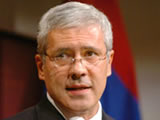|
|
TODAY.AZ / Politics
Serbian leaders gather to challenge U.N. plan for Kosovo
06 February 2007 [02:50] - TODAY.AZ

President Boris Tadic and the leaders of key political parties said after a three-hour meeting that the new parliament, elected last month, should convene as soon as possible. No date for the session was immediately set.
Tadic called Monday's gathering to inform Serbia's main politicians about the Kosovo proposal presented to Serbian and ethnic Albanian leaders last week by U.N. envoy Martti Ahtisaari.
Tadic has rejected the plan, saying it paves the way for the independence of Kosovo, a predominantly ethnic Albanian province that Serbs regard as the historic heartland of their nation.
In a statement issued after the Monday meeting Tadic reiterated that the plan in its current form is "not acceptable for the Republic of Serbia."
Kosovo has been an international protectorate since the end of the 1998-99 war between Serb forces and ethnic Albanian separatists prompted NATO intervention.
The U.N. plan envisages internationally supervised self-rule for Kosovo, which would have its own constitution, flag, anthem and be eligible for membership in international organizations.
Serbian leaders, who are trying to form a new government after the Jan. 21 parliamentary elections, have been invited to offer suggestions on the plan before it goes to the U.N. Security Council, which must approve it.
Ahtisaari has called the first round of consultations for Feb. 13 in Vienna, Austria.
It was not immediately clear who from Serbia will travel to the Vienna talks. Tadic's statement said a Serbian negotiating team should go after it wins backing from the parliament. Other leaders suggested Tadic should go on his own.
Serbian election authorities have said that the parliament can meet after a repeat vote is held this week at several polling stations.
When it convenes, the 250-member parliament is likely to come up with a defiant rejection of the Ahtisaari plan. The assembly is dominated by parties that take a hardline stance on Kosovo. Some politicians have even suggested that ties should be cut with any country that recognizes an independent Kosovo.
Serbia has relied on support from Russia and insists that resolving the Kosovo issue requires full consent from both sides in the dispute.
Meanwhile, the U.S. envoy to Kosovo, Frank Wisner, met with ethnic Albanian leaders in the southern province, reiterating support for the U.N. plan and urging Russia to cooperate. Wisner is due in Belgrade on Tuesday.
Serbia proposed broad autonomy for Kosovo but without a redrawing of borders or full secession of the province.
Ahtisaari proposed autonomy for the Serb minority within Kosovo, but the community leaders said it falls short of ensuring protection for them and scheduled protests against the proposal for Friday. The Associated Press
/The International Herald Tribune/
URL: http://www.today.az/news/politics/35980.html
 Print version
Print version
Connect with us. Get latest news and updates.
See Also
- 22 February 2025 [11:05]
Reception held in Azerbaijan to mark 65th anniversary of Japanese Emperor Naruhito - 21 February 2025 [16:03]
Armen pinned to the wall, but he resists - 21 February 2025 [11:42]
Azerbaijan-OSCE cooperation discussed in Vienna - 21 February 2025 [11:11]
There is not and could not be an "Armenian heritage" in Agdam - 21 February 2025 [10:56]
President Ilham Aliyev receives Chairman of Turkish Parliament’s National Defense Commission - 21 February 2025 [10:45]
EU observers once again spotted monitoring Azerbaijani territories - 20 February 2025 [12:40]
Italian Senate backs resolution supporting Azerbaijan-Armenia peace process - 20 February 2025 [11:46]
President Ilham Aliyev awards Artur Rasizade 'Heydar Aliyev' order - 20 February 2025 [11:26]
Azerbaijan, Iran discuss strengthening parliamentary ties and regional cooperation - 20 February 2025 [11:11]
There is no limit to perfection: Vardanyan continues to lose weight
Most Popular
 Turkiye strengthens energy role with Turkmen gas agreement
Turkiye strengthens energy role with Turkmen gas agreement
 US imposes duties on cars, semiconductors, pharmaceuticals and wood in March
US imposes duties on cars, semiconductors, pharmaceuticals and wood in March
 Erdogan calls Istanbul talks important platform for parties to reach consensus
Erdogan calls Istanbul talks important platform for parties to reach consensus
 Azerbaijan’s firm stance dispels myths of pro-Russian allegiances
Azerbaijan’s firm stance dispels myths of pro-Russian allegiances
 Azerbaijan, Iran discuss strengthening parliamentary ties and regional cooperation
Azerbaijan, Iran discuss strengthening parliamentary ties and regional cooperation
 Hikmat Hajiyev meets with Israeli Prime Minister Netanyahu
Hikmat Hajiyev meets with Israeli Prime Minister Netanyahu
 President Ilham Aliyev visits Khankendi garment factory
President Ilham Aliyev visits Khankendi garment factory
